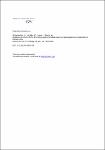Mutations in the M112/M113-coding region facilitate murine cytomegalovirus replication in human cells.
Schumacher, Uwe
Handke, Wiebke
Jurak, Igor
Brune, Wolfram
Cytomegaloviruses, representatives of the Betaherpesvirinae, cause opportunistic infections in immunocompromised hosts. They infect various cells and tissues in their natural host but are highly species specific. For instance, human cytomegalovirus (HCMV) does not replicate in mouse cells, and human cells are not permissive for murine cytomegalovirus (MCMV) infection. However, the underlying molecular mechanisms are so far poorly understood. In the present study we isolated and characterized a spontaneously occurring MCMV mutant that has gained the capacity to replicate rapidly and to high titers in human cells. Compared to the parental wild-type (wt) virus, this mutant formed larger nuclear replication compartments and replicated viral DNA more efficiently. It also disrupted promyelocytic leukemia (PML) protein nuclear domains with greater efficiency but caused less apoptosis than did wt MCMV. Sequence analysis of the mutant virus genome revealed mutations in the M112/M113-coding region. This region is homologous to the HCMV UL112-113 region and encodes the viral early 1 (E1) proteins, which are known to play an important role in viral DNA replication. By introducing the M112/M113 mutations into wt MCMV, we demonstrated that they are sufficient to facilitate MCMV replication in human cells and are, at least in part, responsible for the efficient replication capability of the spontaneously adapted virus. However, additional mutations probably contribute as well. These results reveal a previously unrecognized role of the viral E1 proteins in regulating viral replication in different cells and provide new insights into the mechanisms of the species specificity of cytomegaloviruses.
Files in this item
No license information

